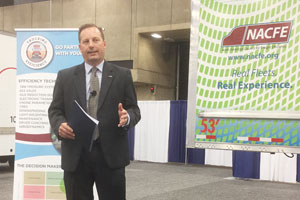Fleets in NACFE Study Saved $477 Million Last Year Adopting New Technologies

The fleets, which are primarily for-hire carriers, saved $9,000 per truck per year, for a total of $477 billion — with an estimated payback period of two-and-a-half-years for their systems — while cutting their carbon emissions by 19%, NACFE said.
“The dramatic improvement in fuel economy by leading fleets is exciting,” said Mike Roeth, NACFE’s executive director and operations lead for Trucking Efficiency, a joint project of NACFE and the Carbon War Room.
“If we can get the owners and operators of the 1.5 million tractor-trailers on the road today to invest in more of these technologies, we will see significant reduction in fuel consumption,” Roeth said in unveiling the results at the annual ACT Expo being held here this week.
The technologies include everything from truck and trailer aerodynamics to low-rolling-resistant tires, idle-reduction systems, engine powertrain optimization and best driving practices.
Roeth told Transport Topics earlier this week that the 14 fleets posted an average of 7 mpg, while 2015 model-year trucks hit as high as 8.5 mpg. That is well above the national average of 5.9 mpg, as reported by the Federal Highway Administration, and higher than the 6.1 mpg they would have seen without the systems, he said.
“Through collaboration with [truck OEMs] and aerodynamic-device and fuel-system suppliers, we are now able to get the aerodynamics we desire on our latest tractors,” said Steve Hanson, director of fleet engineering and sustainability at Frito-Lay, which was one of the 14 fleets.
Frito-Lay has about 33 natural gas-fueled trucks in its Class 8 fleet and plans to add another 125 this year, Hanson told Transport Topics at a press conference announcing NACFE’s findings.
Con-way Truckload gained efficiency by equipping almost half of its fleet with automated manual transmissions, said Randy Cornell, the carrier’s vice president of maintenance and asset management.
“We will continue to buy automated manual transmissions as they are providing fuel savings and drivers appreciate their performance,” Cornell said. Con-way Truckload is a unit of Con-way Inc., which ranks No. 4 in the Transport Topics Top 100 listing of the largest U.S. and Canadian for-hire carriers.
Other TT100 fleets in the NACFE program include UPS Inc. (No. 1), Schneider (No. 7), the dedicated fleet of Ryder System, affiliated with Ryder Supply Chain Solutions (No. 11), Werner Enterprises (No. 14), C.R. England (No. 20), Prime Inc. (No. 22), Crete Carrier Corp. (No. 30), Bison Transport (No. 55) and Challenger Motor Freight (No. 77).

